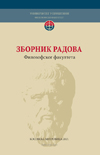Logical Empiricism and the Principle of Verifiability
Abstract
This paper represents an encounter and dialogue between philosophy of language and analytic philosophy. The main aim is to present the logical empiricism of the milieu of its creation in the Vienna Circle. Exhibited are significant points of known members of the Vienna Circle, not only on the logical empiricism as a theory and movement, but also considers its close link with the principle of verifiability, the purpose of which we list and explain the variations of the definition of verificationism as the basis of logical empiricism. In the Vienna Circle we distinguish several streams with respect of the definition of the principles of verification, and one of them proposed formulation of this principles as a theory of meaning which also require a complete verification. The second stream is leaning to the formulation of criteria for determining the meaning and they put their focus on incomplete verification. Having both pozitions in mind we are able to make distinction between criteria of adequacy and criteria of utilitarty of the principle of verifiability. This fact implies that it is vital to determine the necessary conditions of adequacy of the principle of verifiability, which primarily reflectes in the preservation of empiricism where the main terms used in the formulation must be clear, non-ambiguous and operational.
References
Carnap, R. (1935). Philosophy and Logical Syntax. London: Kegan Paul, Trench, Trubner &Co. Ltd., Broadway House Carter Lane E. C.
Feigl, H. (1969). „The origin and spirit of logical positivism”. U P. Achinstein i S.P. Barker (ur.), The legacy of logical positivism. Baltimore: The Johns Hopkins Press.
Griffin, J. (1969). Wittgenstein's Logical Atomism. Washington: Washington Press.
Jorgensen, J. (1951). „The Development of logical Empiricism”. U Foundations of the Unity of Science. Chicago: Chicago University Press.
Kraft, V. (1953). The Vienna Circle, the Origin of Neo-Positivism. New York Philosophical Library.
Russell, B. (1905). On Denoting. Mind, New Series, 14(56),
Russell, B. (1959). My Philosophical Development. New York: Simon and Schuster.
Soames, S. (2003). Philosophical analysis in the twentieth century, vol. I „The Dawn of Analysis”. Princeton University Press.
Wittgenstein, L. (1987). Tractatus Logico-Philosophicus. Sarajevo: Veselin Masleša – Svjetlost.
The details about the publication policy, including copyright and licensing, are available at:

